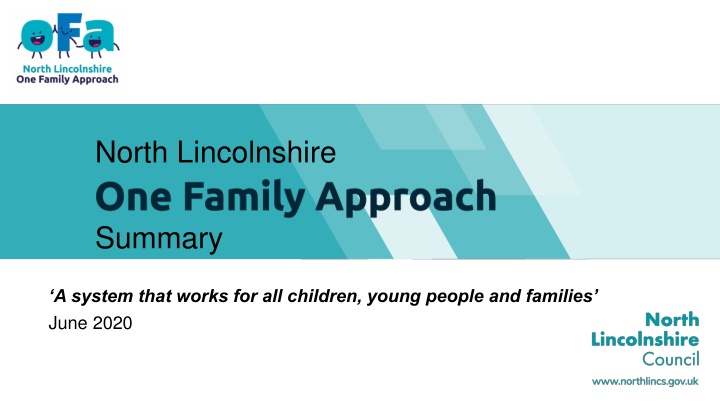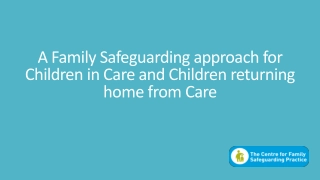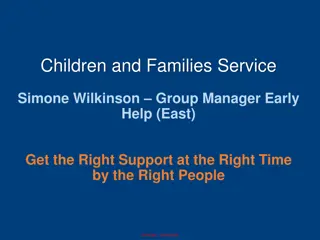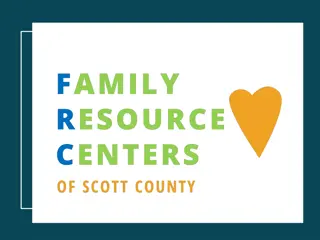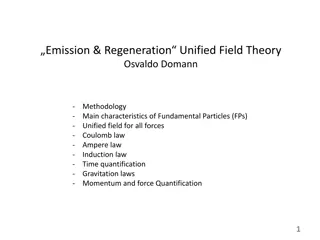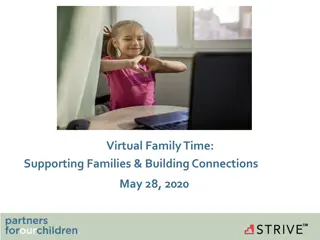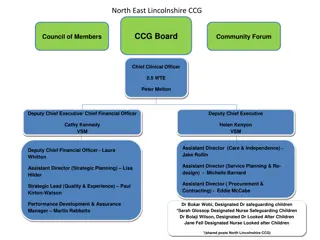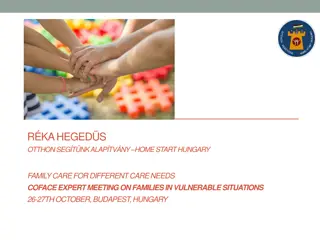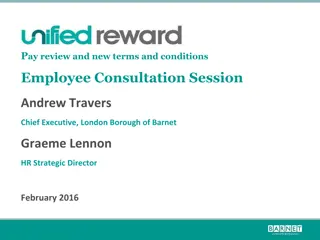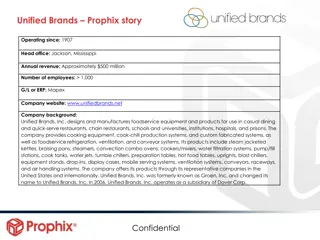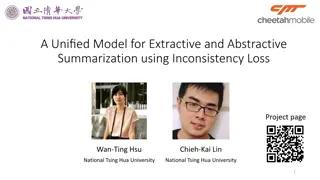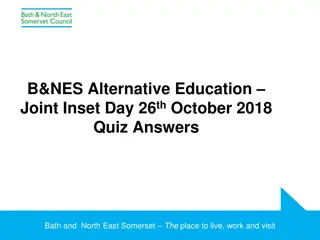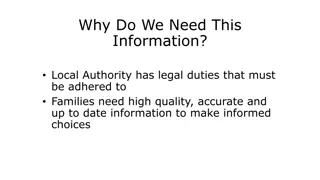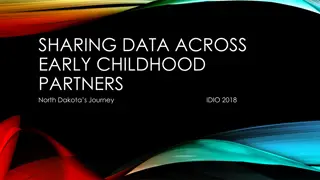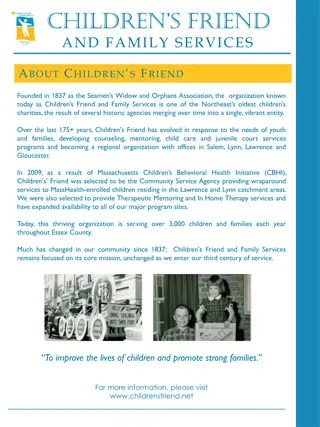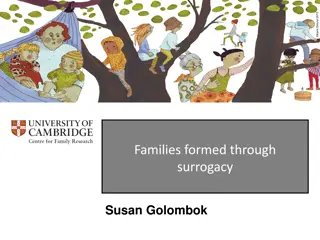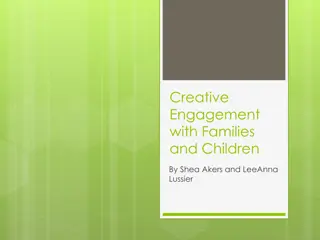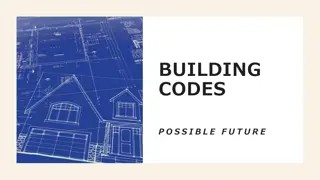Building a Unified System for Children and Families in North Lincolnshire
The One Family Approach in North Lincolnshire aims to create an integrated system that prioritizes the well-being of children and families. By focusing on strengths, community involvement, and empowerment, the approach seeks to improve outcomes and ensure safety, wellness, prosperity, and connectedness for all. Through a dedicated workforce and innovative strategies, the vision is to support families effectively and promote independence while addressing challenges swiftly and creatively.
Download Presentation

Please find below an Image/Link to download the presentation.
The content on the website is provided AS IS for your information and personal use only. It may not be sold, licensed, or shared on other websites without obtaining consent from the author.If you encounter any issues during the download, it is possible that the publisher has removed the file from their server.
You are allowed to download the files provided on this website for personal or commercial use, subject to the condition that they are used lawfully. All files are the property of their respective owners.
The content on the website is provided AS IS for your information and personal use only. It may not be sold, licensed, or shared on other websites without obtaining consent from the author.
E N D
Presentation Transcript
North Lincolnshire Summary A system that works for all children, young people and families June 2020
Introduction The One Family Approach is about how we collectively respond to the needs of children and families in North Lincolnshire as we respond to new challenges and move to a more integrated services for children. It provides a vision and framework for a new system that places children and families at the centre a One Family Approach to strategy, commissioning, planning, practice, and outcomes. The One Family Approach may be new, but it is based upon our North Lincolnshire values and beliefs, capturing our intent to keep children in their families, their schools and their communities. It provides a model for innovative, integrated working which builds upon strengths, find solutions in families and communities, develops resilience and confidence, and enables independence. Ultimately OFA presents a new model of help and protection, to improve the experiences and progress of children and families to be safe, well, prosperous and connected. SAFE WELL PROSPEROUS CONNECTED
Vision and Ambition Children in their families, their schools, and their communities We all want to live in a place we call home, with the people and things that we love, in communities where we look out for one another, doing things that matter to us. As partners taking a One Family Approach across North Lincolnshire, we want children, young people and families to be able to help themselves, to actively participate in and be supported by their communities and be able to access available information, amenities, settings and services, so they can develop skills and resilience and enable behaviour changes that will contribute to them being safe, well, prosperous and connected. We want all children and families to have a sense of belonging and equality of opportunity and through our integrated working, we will enable those more in need to achieve positive outcomes. Where there are significant concerns, we want children, young people and families to be able to access swift, creative and flexible agency involvement so they are empowered to protect themselves and reduce harm leading to their independence from services and to improved outcomes SAFE WELL PROSPEROUS CONNECTED
One Family Approach Workforce We want children, young people and families to be supported by a workforce that is resilient, confident, competent and with authorisation to do what they think is the right thing to do without escalating children and families unnecessarily through a range of organisational systems and referral pathways when the day to day contact with trusted professionals can make the difference. We will listen to families, work to build upon the child and family's strengths, help them find solutions and only when necessary consult with others to seek assurance, advice and consultation, and continue to support the child and family. We will prioritise services to our most vulnerable children and young people to ensure that they have fair and equitable opportunities to be the best they can be, irrespective of their background and circumstances. We will develop an integrated workforce, one that works with the whole family, where we reduce unnecessary duplication of professionals involved with a child and family, and use formulation and quality supervision to focus upon doing the right things that will make the most difference. SAFE WELL PROSPEROUS CONNECTED
Strategic Context The Integrated Children s Trust (ICT) and Children s MARS arrangements provide leadership of help and protection system. 3 new, overarching strategic documents: Children s Challenge 2020-24 Integrated Children s Commissioning Strategy 2020-24 Helping Children and Families Document (previously threshold document) 2020-24 SAFE WELL PROSPEROUS CONNECTED
One Family Approach Organisational Model SAFE WELL PROSPEROUS CONNECTED
One Family Approach Practice Model Helping Children and Families in North Lincolnshire 2020/24 North Lincolnshire values Our One Family Approach is underpinned by 4 values which drive and unite our practice, behaviour, and decisions: Equality of opportunity - where all children, young people and families, regardless of need, community, or diversity, have equal access to the same opportunities to achieve their potential and positive outcomes. To achieve this involves working anti-oppressively to challenge disadvantage and adversity. Excellence - where we have high aspirations for children, young people and families and high expectations of each other across the workforce, and support and challenge together as we strive for best practice and best outcomes. Integrity - where we are respectful, honest and accountable in our actions, where behaviours build trust and effective relationships, and we uphold the highest standards including the creative use of resources across the partnership to achieve shared outcomes for children, young people and families Self responsibility where confident and autonomous professionals enable and empower others to have choice and control over their lives, to make decisions and have a voice, and to live independently from services in their families and communities Strengths based and solution- focused Being strengths-based and solution-focused is how we seek to achieve enabling sustainable change that improves the wellbeing of children and young people. A strengths-based and solution-focused approach demonstrates our commitment to positive, co-producing practice done with and not to children and families. It encourages positive worker-family relationships, and positive restorative conversations that helps people build confidence for the future based upon what is working well . Taking a solution-focused mind-set into our work with children, young people and families reflects our beliefs in North Lincolnshire that the answers to challenges and problems are found within families and communities. Effective help and protection is founded upon people being inspired and enabled to resolve and overcome their difficulties, and be more resilient into the future. Being strengths-based and solution-focused does not mean discounting or minimising risk, it calls for risk to be assessed and responded to in a proportionate and sensible way, so that action aims to increase safety rather than reduce professional anxiety. Supplementary information and connected tools: North Lincolnshire Risk Assessment Framework (RAF) (see supporting document 1) North Lincolnshire Exploitation Vulnerability Checklist (see supporting document 2) North Lincolnshire One Family Approach Contextual Safeguarding Approach (see supporting document 3) The One Family Approach practice model is how we respond to the needs of children, young people and families in North Lincolnshire as one workforce in an integrated services for children. Relational Being relational in our practice reflects the priority and centrality that we give in North Lincolnshire to family and to community, to identity and to attachment, to teamwork and to love. Building, maintaining, and strengthening relationships improves the wellbeing of children and young people. A relational approach to our work means we take the time to listen, take the time to build rapport, and provide help through trusted relationships. We seek to understand children s and adults experiences in the context of their system their relationships with family, friends, and their community. Formulation gives meaning to the information we collect, encouraging evidence-informed decisions and creative responses to presenting needs, helping agencies to get it right first time and prevent families re-telling their stories. Being relational and restorative sees a high priority given to partnership and co-production, and allowing families to lead their own narratives. When behaviour harms, the professional response must be swift and effective, with families supported to change in the child s timescales. Supplementary information and connected tools: North Lincolnshire One Family Approach Formulation model (see supporting document 4) North Lincolnshire Relational and Restorative Practice Guide (see supporting document 5) North Lincolnshire Family Solutions Approach (see supporting document 6) It is founded upon our North Lincolnshire culture, values and beliefs, capturing our intent to keep children in their families, their schools and their communities. It sets out the key features of partnership practice in North Lincolnshire which builds upon strengths, finds solutions in families and communities, builds resilience and confidence, and enables independence. SAFE WELL PROSPEROUS CONNECTED NORTH LINCOLNSHIRE INTEGRATED CHILDREN S TRUST/CHILDREN S MARS BOARD
What will success feel like? PROSPEROUS SAFE WELL CONNECTED Where children and families: Where children and families: Where children and families: Where children and families: are enabled to have social mobility and equal access to resources in their early years and education have high levels of speech, language and communication skills have equal and fair access to a consistent, high quality education offer in schools and setting are empowered, enabled and supported to achieve as they transition to adulthood achieve their potential (including the most vulnerable) have a sense of belonging and feel safe/are safe in their home, school and community are supported to withstand adverse impacts and change behaviours are empowered and supported to identify and develop their strengths and aspirations live in one family which reflects their needs and circumstances are a healthy weight and live active lives enjoy positive emotional wellbeing and mental health receive the health care and support they need in their community where possible learn resilience and self-regulation through effective provision in settings and schools are empowered and enabled to participate, have equality of opportunity and access to creative, flexible support at the earliest point in the right place by the right people benefit from engaging in positive activities build resilience and find resolutions for themselves are able to transport themselves around the area have access to info and resources online and social media have a home, a job and a friend (including vulnerable adults) SAFE WELL PROSPEROUS CONNECTED
Early Help in North Lincolnshire Helping Children and Families in North Lincolnshire 2020/24 Most children and families are resilient and thrive, knowing where to go for help and support when needed. But equally, any family or individual can experience difficulties and sometimes people need extra help to see them through challenging times. Professionals need to be alert to the signs of adversity and stress, and certain specific additional vulnerabilities that may increase the need for early help. Where a child: is disabled and has specific additional needs has special educational needs is a young carer is showing signs of or engaging in anti-social or criminal behaviour is in a family circumstance presenting concerns for the child, such as substance abuse, adult mental health and domestic abuse is showing early signs of abuse and/or neglect is showing early signs of mental health issues, including self-harm is vulnerable to or experiencing sexual or criminal exploitation, radicalisation, gang activity, or other risks that are contextual in nature is living away from home is vulnerable to Female Genital Mutilation and other forms of body mutilation or family have additional vulnerabilities e.g. cultural, immigration status, language, literacy, temporary accommodation, recent trauma, social exclusion When early help is needed, we know that families want help from people and professionals that they know and trust. The One Family Approach gives the permissions for professionals, including those working with adult family members, to act early and provide the help that is needed. In line with the single organisational model and the One Family Approach practice model set out in this document, professionals should seek to enable families to find solutions, based upon their strengths, to improve outcomes and be independent from services. Professionals should know when and how to make a plan for a child and their family, when they should access further help and support from their manager or partner agencies, and when to refer to social work services in line with the specialist level of need outlined within this document. For families receiving coordinated early help from two or more agencies at targeted focused level: The needs and strengths of the whole family should be captured in an early help assessment, undertaken by the lead professional, with a clear focus on the child Early Help assessments and the outcome should be recorded on the online DASH system There should be a plan of enabling help, developed with the family, aimed at improving outcomes and reducing need, which is regularly reviewed with the family until no longer needed Early help should be provided with the consent of, and in partnership with families. The voices of children and adult members should be clear throughout. If progress for children is insufficient or if the help does not improve outcomes, other approaches should be taken. Supervision and peer support may help identify other, sometimes creative, solutions. If the needs of children escalate and require a specialist service in line with the levels of need set out in this document a referral should be made to children s social work services. Leaders in individual agencies should have appropriate systems in place to ensure effective oversight and quality assurance of early help work SAFE WELL PROSPEROUS CONNECTED NORTH LINCOLNSHIRE INTEGRATED CHILDREN S TRUST/CHILDREN S MARS BOARD
Levels of Need - Universal (Self Help and Enablement) - Overview Helping Children and Families in North Lincolnshire 2020/24 Children and families can access the earliest help through universal services: a midwife, health visitor, a school nurse, at the local community hub, their GP, their school and other services and groups available to them in their communities or online. All services should help support children and families to find their own solutions, this may include helping them access the internet for information, advice and guidance with regard to a specific issue, signposting them to help within their community, including helping them make contact with specific services - housing advice, debt management, support groups - and of course offer direct support and encouragement to build on strengths and make positive change. Early Help Assessment - Services should offer an early help assessment to children and families who have additional needs over and above those they can help within the context of their own agency s core function. This will cover the child, the family/wider family and the environmental factors that have an influence upon the child s life. This assessment should be child centred and undertaken in partnership with the child and family and shared with them. It should in the first instance be used to shape the service and enable agencies to work together at the lowest possible level to offer to offer strengths based and solution-focused early help and prevent escalation. It is important when conducting an early help assessment that consent to share information is provided and that the assessment engages and embraces the child and family, involving others in being part of a wider multi-agency approach and plan to promote the child s wellbeing, promote positive parenting and prevent needs and problems from escalating and becoming problematic. Universal (Self Help and Enablement) - Within specific populations, communities, community hubs and area wide The majority of children in North Lincolnshire have their needs met by their parents and family members where there are positive/protective factors. Within the right conditions, with the right information, advice and guidance and through taking self responsibility, children and families actively participate in and are supported by their communities. They can make use of available information, amenities, settings and services that are accessible to all to help themselves to raise awareness, develop skills and resilience and enable behaviour changes that will contribute to them being safe, well, prosperous and connected (such as the GP, children s centre, school, health visitor, or local wellbeing hub). This support relies upon the skill and ability of the worker and their motivation to help within the context of their role to make every contact count. This can also involve the provision of advice, signposting and guidance. Universal Services have long(er) term involvement with children and families and play a key role in helping them throughout stages of life. Services are encouraged to help and support children and families to resolve need at this level. Levels of Need Universal (Self Help and Enablement) Descriptors detailed in Appendix 8 SAFE WELL PROSPEROUS CONNECTED NORTH LINCOLNSHIRE INTEGRATED CHILDREN S TRUST/CHILDREN S MARS BOARD
Levels of Need Targeted (Focused and Preventative) - Overview Helping Children and Families in North Lincolnshire 2020/24 Targeted (Focused and Prevention) - Within specific populations, communities, community hubs and area wide for those who seek out and/or are identified as requiring additional help via consultation / formulation Targeted informal Sometimes children and families need more structured and targeted help to prevent needs from escalating, and to support them through times that may be challenging. Children and families are entitled to equality of opportunity and through individual agencies or multi agencies/integrated working, children, young people are helped, supported and empowered to enable behaviour changes that will contribute to them being safe, well, prosperous and connected, preventing the need for more specialist help. At targeted informal level, one professional may be able to provide the extra help that is needed, or help the family to identify where to access the right help, and then support them through, this could include welfare rights and debt management, health issues, or behaviour management strategies in the home. For instance a school nurse or learning mentor are encouraged to offer support where they can do so and where this does not necessitate formal assessment and planning. They should help children and families resolve any difficulties. Services should use the early help assessment and framework to work with children and families and shape their work where this helps. Targeted formal single or multi-agency At targeted formal level children s needs are such that a more structured support plan is required to co-ordinate the help needed to achieve agreed outcomes. It may be that the needs of the child are escalating and help at a targeted-informal level has not been sufficient, or that needs are reducing from a period of specialist intervention. At this level there may be concern about a number of risk factors but where the threshold for statutory social care intervention is not met. These factors may include ongoing lower level neglect, domestic abuse, adult or child mental / emotional health problems, substance misuse, adolescent vulnerabilities, anti-social and or risk taking behaviour, and it may be difficult to engage family members to create change. In such circumstances a multi-agency early help assessment should be undertaken to understand how best agencies can work together with the family to reduce the level of need. After the assessment the early help plan should be co- ordinated by a lead professional who takes responsibility for reviewing the plan. Levels of Need Targeted (Focused and Preventative) Descriptors detailed in Appendix 8 SAFE WELL PROSPEROUS CONNECTED NORTH LINCOLNSHIRE INTEGRATED CHILDREN S TRUST/CHILDREN S MARS BOARD
Levels of Need - Specialist (Protection) - Overview Helping Children and Families in North Lincolnshire 2020/24 For those children and families who are more vulnerable, where early help plans are not making sufficient positive difference and the child may be at risk of long term impairment to health and development and or where they are at risk of or have suffered significant harm: Definition - Children in Need is defined under the Children Act 1989 as a child who is unlikely to achieve or maintain a satisfactory level of health or development, without provision of services or a disabled child (Children in Need may be assessed under section 17 in relation to their Special Educational Needs, disability, as a young carer, because they have committed a crime or because they are a child who is unaccompanied and seeking asylum) Definition Significant Harm The Children Act 1989 introduced significant harm as the threshold that justifies compulsory intervention in family life and in the best interest of the children. Physical Abuse, Sexual Abuse, Emotional Abuse and Neglect are categories of significant harm. Harm is defined as the ill treatment or impairment of health and development. It was defined in the Adoption and Children Act 2002 that it may also include impairment suffered from seeing or hearing the ill treatment of another. Whenever there is reasonable cause to suspect that a child is suffering or is likely to suffer significant harm. Working Together 2018 clarifies that the local authority shall make enquiries as they consider necessary to enable them to decide whether they should take any action to safeguard or promote a child s welfare. A strategy discussion with Police, Health and Education and any other agency identified as required should be held in order to determine the required next steps. Agencies are required to refer to Children s Services and to provide information in writing to support referrals, in line with relevant MARS procedures. Referrals to Specialist / Social Work Services should be made to Children Services Single Access Point on 01724 296500. Out of office hours for Child Concern 01724 296555, free phone number 0808 1689 667. SAFE WELL PROSPEROUS CONNECTED NORTH LINCOLNSHIRE INTEGRATED CHILDREN S TRUST/CHILDREN S MARS BOARD
Approach? Key Features Clear vision a system that works for all children, young people, and families New organisational model families at the centre, self-help and enablement One Family Approach practice model strengths based, solution focused An outcome focussed, whole-family, preventative system SAFE WELL PROSPEROUS CONNECTED
